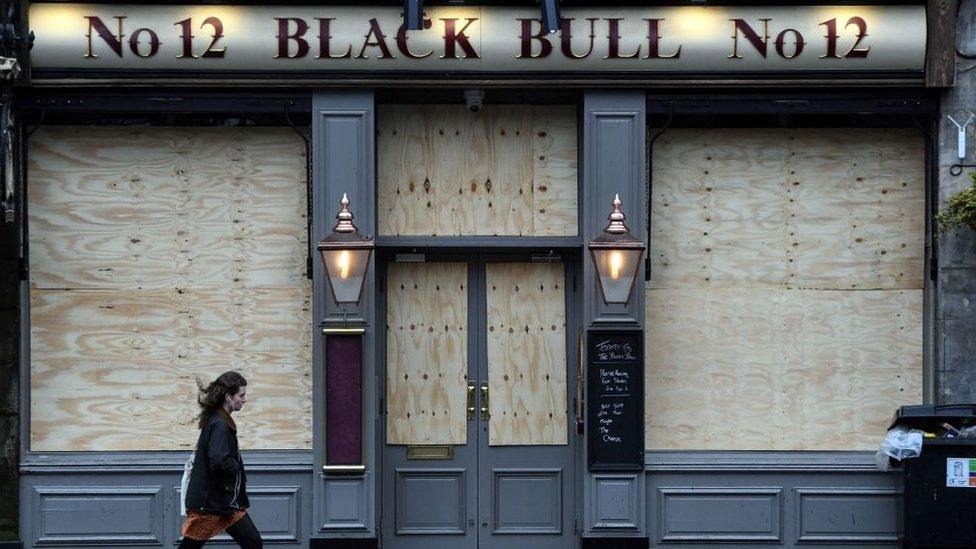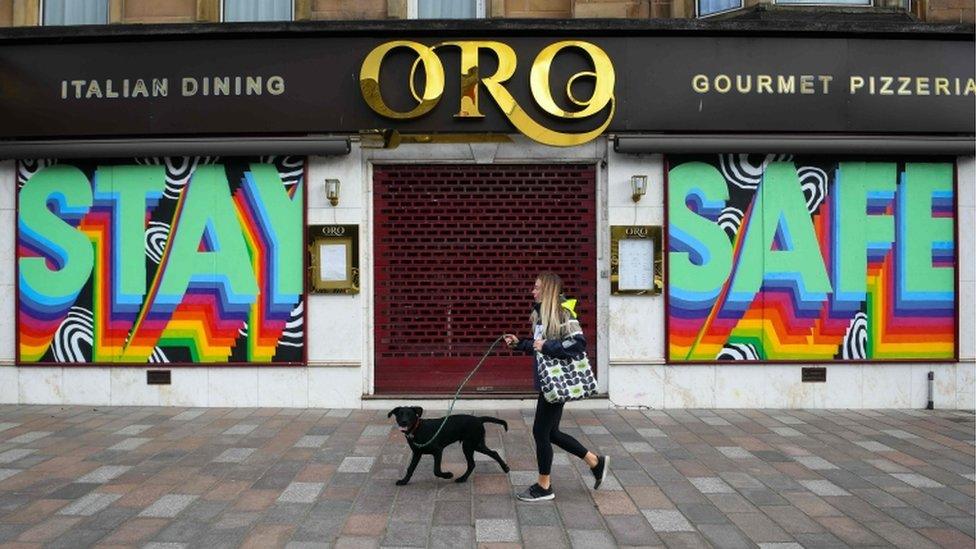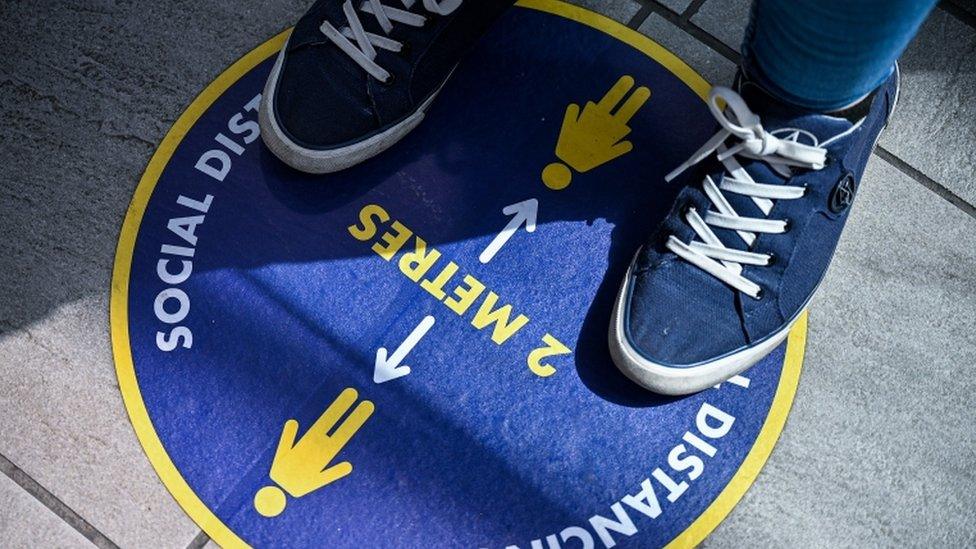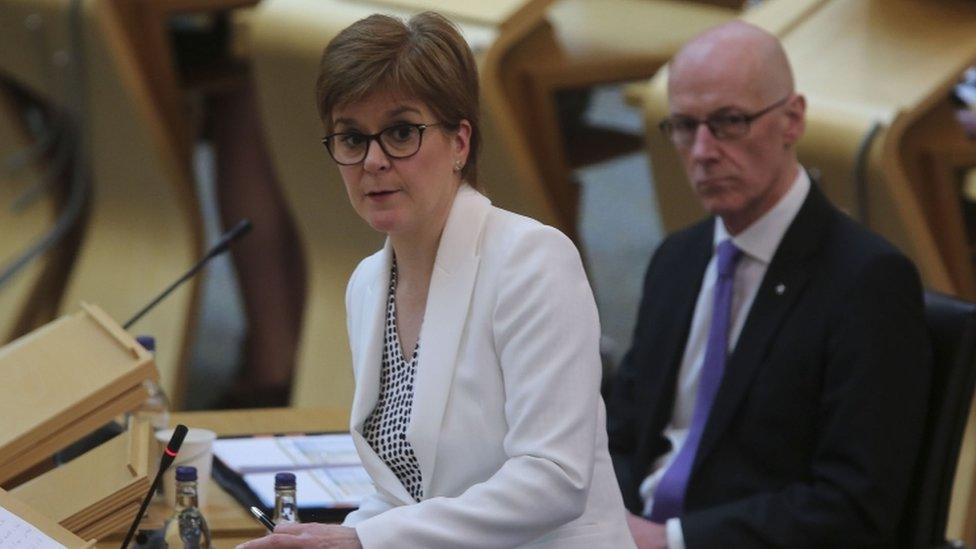Coronavirus: Scottish pubs and restaurants to reopen in July
- Published
- comments

Scottish pub and restaurant businesses have been shut down by the coronavirus lockdown
People in Scotland will be allowed to meet up with two other households indoors from 10 July and pubs and restaurants can re-open from 15 July.
First Minister Nicola Sturgeon also said the five-mile travel limit will be lifted from 3 July, while beer gardens can re-open from 6 July.
Hairdressers and barbers can open from 15 July, as can holiday accommodation.
Ms Sturgeon said the move was possible thanks to the "real sustained progress" made in suppressing coronavirus.
But she said the changes depended on keeping the virus under control, and could be reversed if there was a fresh outbreak.
And they will not apply to people who are shielding, who will be given further advice "before the end of July".
The first minister was speaking as new data showed that the coronavirus death rate has continued to fall for the eighth week in a row, with Ms Sturgeon saying these "clear trends" meant "firmer milestones" for the journey out of lockdown could be set.
Advisors are still reviewing whether the 2m (6ft 6in) physical distancing rule should be eased, but a range of different shops and services can now begin planning for re-opening in mid-July.
The government's revised routemap, external said shopping centres and dental practices could fully re-open from 13 July, while optometrists can begin to scale up work.
From 15 July, all holiday accommodation can open up, along with indoor areas of pubs and restaurants and hairdressers and barbers. These moves depend on safety measures being put in place, and hospitality businesses will have to retain contact details for customers for four weeks.
Museums, galleries, cinemas and libraries will be allowed to resume business from the same date, as long as physical distancing and other safety measures are enforced.
However live entertainment venues like theatres, nightclubs and bingo halls "will not reopen until a later date", while "further consideration" is being given to the opening of indoor gyms and restrictions on weddings and funerals.

What will reopen and when?

29 June - Most non-essential shops, many indoor workplaces, visitor attractions including zoos, outdoor sports courts and playgrounds
3 July - Five mile travel distance relaxed, most self-catering holiday homes and second homes can be used
6 July - Outdoor hospitality such as beer gardens can reopen
10 July - People can meet in extended groups outdoors and with two other households indoors
13 July - Shopping centres can reopen, organised outdoor contact sports for children can resume, dentists can reopen for most routine care
15 July - Pubs, restaurants and all holiday accommodation can reopen, as can hairdressers, barbers, museums, cinemas, libraries and childcare

Ministers have already announced that they are planning for schools to return full-time from 11 August with no physical distancing between pupils.
Ms Sturgeon said that on 1 May, it was estimated that about 25,000 people in Scotland had the virus - but that she expected that figure to be "around 2,000" when new figures are published on Thursday.
She said this was "down to people doing the right thing and following the rules", saying: "The sacrifices that have been made have suppressed the virus, protected the NHS and undoubtedly saved a significant number of lives."

Scotland will not decide whether to follow England in relaxing the 2m rules until at least next week
The first minister said Scots "must not be complacent" about the dangers of Covid-19, but said if progress continued to be made then "the prize is getting greater normality back in our lives, maybe more quickly than we would have envisaged a few weeks ago".
Many of the changes mirror those announced for England by Prime Minister Boris Johnson on Tuesday, but with dates around two weeks later.
Ms Sturgeon accepted that Scotland's pace in exiting lockdown "is slightly slower than England's", saying this was "in my view right for our circumstances and I hope more likely to be sustainable than if we went faster".
The Scottish Conservatives said the delay "will cost millions at a time when thousands of jobs are already on the line", saying that "Scotland has to look on while the rest of the UK and Europe resumes normal life".
Ms Sturgeon said she was not prepared to take part in "some kind of reckless race" with other parts of the country, saying opposition attacks were "grubby political opportunism at a time of national crisis".


None of the changes Nicola Sturgeon announced today take immediate effect. Instead she has offered a series of dates to pencil into our diaries - the promise of further freedoms to come.
The first minister acknowledged that the pace of easing lockdown in Scotland is "slightly slower" than in England, but said she wanted to continue to move carefully to reduce the chance of a coronavirus resurgence.
When (non-essential) high street retailers reopen on Monday in Scotland, similar shops in England will have been trading for a fortnight.
But not everything is happening later here.
If new plans for the full return of schooling go ahead in August - when Scottish schools normally go back from their summer break - Scotland could be the first part of the UK to achieve that.
Everything is of course conditional on the continued suppression of the virus.
The signs in Scotland are good, with a further reduction in the weekly number of virus-related deaths being reported by the National Records of Scotland today.


Ms Sturgeon accused her opponents of "grubby political opportunism"
Ms Sturgeon said each step towards easing lockdown "depends on us continuing to beat the virus back" and could potentially be reversed.
She said: "Our challenge, not an easy one, is to manage all of this change while keeping the virus firmly under control. If at any stage there appears to be a risk of its resurgence, our path out of lockdown will be halted and we may even have to go backwards.
"To avoid that, we must get as close as possible to elimination of the virus now, and build confidence in our ability to control it in future through surveillance, testing, contact tracing and, where necessary, targeted suppression measures."
Information leaflets about the government's contact tracing system are being delivered to every household in Scotland, while ministers are considering whether to make face coverings mandatory in shops.

RISK AT WORK: How exposed is your job?
EXERCISE: What are the guidelines on getting out?
THE R NUMBER: What it means and why it matters
RECOVERY: How long does it take to get better?
